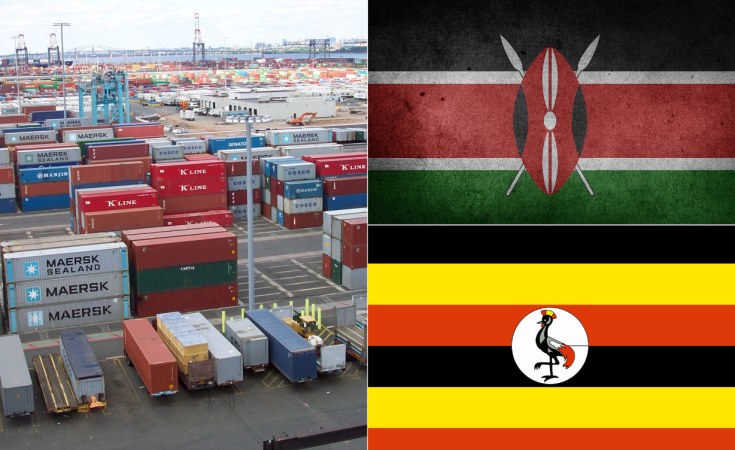By Faridah N Kulumba
Africa-Press-Uganda The latest trade war between Uganda and Kenya started in 2019 when Kenya banned Uganda from importing milk. The trade wars between the two neighboring countries are not only a threat to economic prosperity in the involved states but are also a threat to free trade in the East African Community (EAC).
Kenya-Uganda ties
The two African Great Lakes nations are partners in many areas, particularly in trade, infrastructure, security (military), education, agriculture, and the energy sector. Uganda and Kenya are founding members of the original EAC, which collapsed due to ideological differences and territorial disputes within itself, but in 2000, the two countries together with Tanzania reestablished the EAC. With the intention of improving trade and bilateral ties between Uganda and Kenya.
Sugar and poultry ban
The government of Kenya in July 2020, instituted a ban on Ugandan sugar against an earlier agreement to increase Uganda’s sugar exports to Kenya. In January 2021, Uganda lost billions of money after Kenya banned all the importation of chicken carcasses, meat, and eggs.
Kenya’s defense
According to Kenya, the ban was to support Kenyan producers to recover from the trade disruptions in their livestock by the Covid-19 pandemic from 2020. In March 2021, Kenya added maize and chicken to the list of banned exports from Uganda.
Payback
Kenya’s ban on eggs from Uganda quickly escalated into a diplomatic row, in December 2021, Uganda retaliated by placing an embargo on some raw and processed agricultural products coming from Kenya.
Ugandan authorities headed by Uganda People’s Defence Forces Fisheries Protection Unit (FPU) and Uganda Revenue Authority (URA) impounded close to 20 tonnes of allegedly immature fish as goods in transit from Kenya to the Democratic Republic of Congo. Uganda insisted that these tonnes of fish were from Uganda due to the fact that the trucks which were carrying them were registered in Uganda.
Effects
The back and forth between the two East African Community member states are ultimately bound to decrease trade volume within the region.
Trade value
For many years Uganda is Kenya’s largest export destination. In 2020, Uganda took up the most significant fraction of Kenyan exports at 11.2 percent of total export value. Also, Kenya was the second-largest export market for Uganda in 2019, with the country’s goods destined to Kenya taking up 9.38 percent of the total export value.
Prophecy
Analysts predict that these cold trade wars between Uganda and Kenya will ruin the two nations’ vibrant commercial relationship.
Victims of conflicts
The consumers in Uganda and Kenya are the most affected by these wars. The economic conflict has led to higher import prices and ultimately higher consumer prices. Experts have warned that consumers will be the main losers. Most households are denied cheap high-demand goods whose local production has not been able to keep up.
Outcomes
What worries the analysts is that the imposition of quotas and other restrictions leads to unemployment. The Kenya and Uganda trade conflicts are counterproductive to both nations and pose a fatal risk to free trade in the region which needs much attention.
Solutions
The East African Business Council (EABC), an umbrella body for the region’s business community would need to speed up its arbitration process so that both parties can have a bilateral dialogue to eliminate all outstanding Non-Tariff Barriers (NTBs) between them, equally, economic arbitration via political avenues is available method to resolve the wars. The parties involved only need to heed the call because the trade wars violate the Protocol on the Establishment of the East African Community Market (EACM).
Rule of law
The East African Court of Justice (EACJ) also has a role in ensuring complete application of and compliance with the EAC Treaty, The EACJ’s commitment will enable settling the economic disputes between the member states.
Assumption
The EAC should adopt a system similar to the World Trade Organization (WTO) dispute settlement system. This adoption should help settle the Kenya-Uganda trade wars once and for all. A replication of the WTO’s compulsory nature and enforcement mechanism of its dispute settlement system would end the trade wars.
More so, partner states need to ratify Article 24 (2) of the EAC Customs Union Protocol to pave the way for the operationalization of the EAC Trade Remedies Committee. The Trade Remedies Committee reflects the WTO panel system would effectively mediate the trade conflicts. These trade conflicts are not only a threat to economic prosperity in the involved states but are also a threat to free trade in the EAC.






